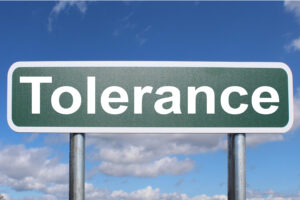“But I have this against you, that you tolerate that woman Jezebel, who calls herself a prophetess and is teaching and seducing my servants to practice sexual immorality and to eat food sacrificed to idols” (Revelation 2:20 ESV).
In the passage quoted above, Jesus uses the word “tolerate” or “allow” (NKJV) to identify a situation that required correction in the ancient church at Thyatira. In the original language of this verse, those words convey the following idea: “to allow one to do as he wishes, not to restrain, to let alone.” (1) With this in mind, we can say that the Christians in Thyatira were not misled by what was taking place within their fellowship. Instead, they knowingly permitted these inappropriate actions to continue within the church.
 Before we continue with our look at this subject, we should first be clear that “tolerance” is very important when speaking of things like freedom from bigotry or the ability to be patient and fair with others. The Bible supports this concept of tolerance in verses such as Titus 3:2 where we are told that Christians “…must not speak evil of anyone, nor quarrel, but be gentle and truly courteous to all” (TLB). We also find support for this idea in the following passage from the New Testament book of Ephesians: “Be completely humble and gentle; be patient, bearing with one another in love” (Ephesians 4:2 NIV).
Before we continue with our look at this subject, we should first be clear that “tolerance” is very important when speaking of things like freedom from bigotry or the ability to be patient and fair with others. The Bible supports this concept of tolerance in verses such as Titus 3:2 where we are told that Christians “…must not speak evil of anyone, nor quarrel, but be gentle and truly courteous to all” (TLB). We also find support for this idea in the following passage from the New Testament book of Ephesians: “Be completely humble and gentle; be patient, bearing with one another in love” (Ephesians 4:2 NIV).
The problem arises when we equate “tolerance” with a mandate to affirm or endorse any attitude, belief, or opinion that others may hold. That perspective fails to recognize the fact that genuine love necessitates an attitude of intolerance towards things that may bring harm to others. So even though the church in Thyatira had been commended for their love, that did not permit them to allow someone who claimed to speak for God to advocate for these unbiblical behaviors.
In this instance, it would have been far more appropriate to speak the truth with an attitude of love (Ephesians 4:15) by correcting the person who promoted these views instead of tolerating them and permitting them to continue.
At the core of this issue was an individual identified by Jesus as “Jezebel” in Revelation 2:20. That name may be familiar to readers of the Old Testament, for a dangerous woman bearing that name is referenced several times there. Whenever Jezebel is mentioned in the Scriptures, it seems that something bad inevitably follows- and we’ll look at one such example next.
Image Credit: Tolerance by Nick YoungsonCC BY-SA 3.0Pix4free.org
(1) G1439 – eao – Strong’s Greek Lexicon (kjv). (n.d.). Blue Letter Bible. https://www.blueletterbible.org/lexicon/g1439/kjv/tr/0-1/

